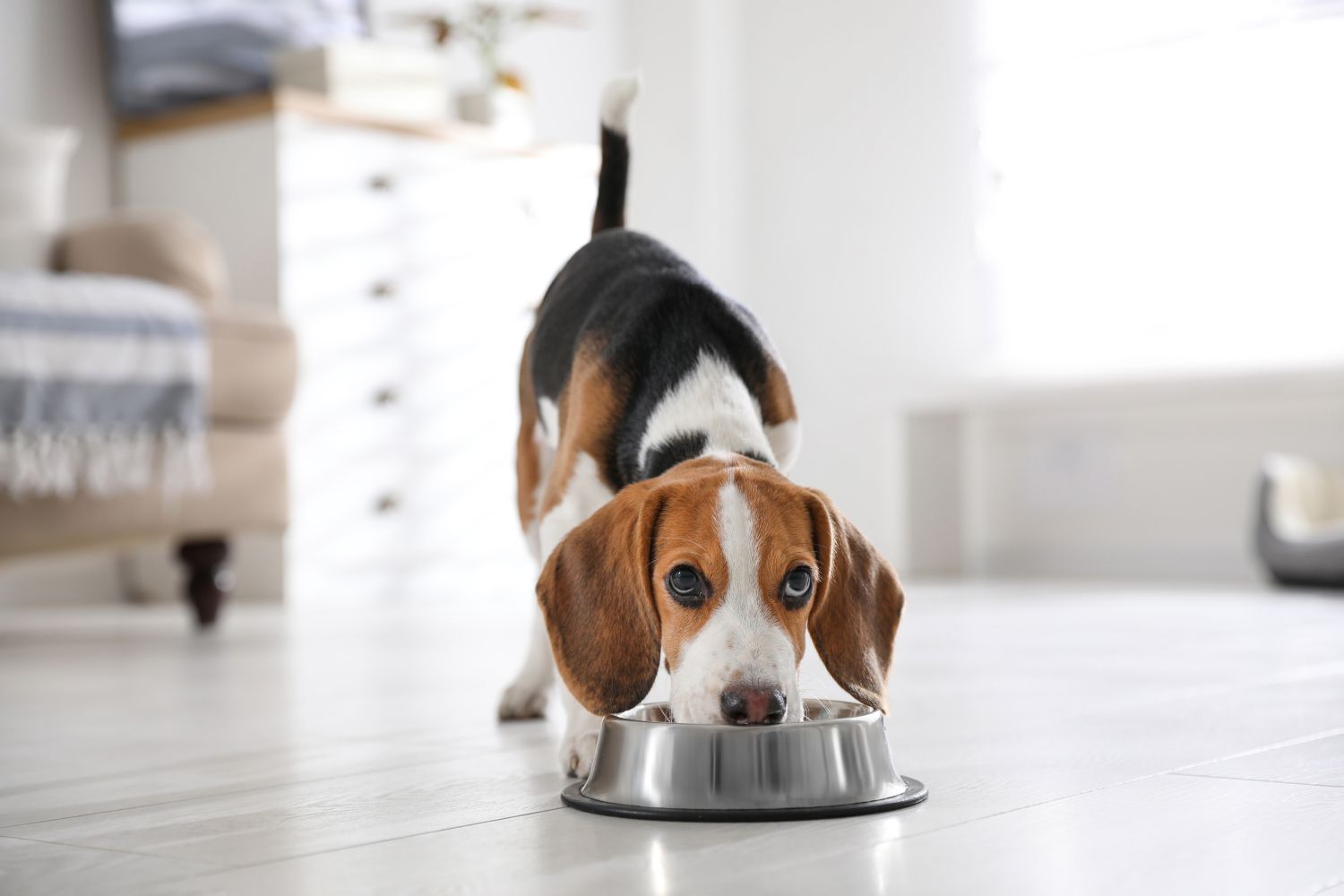
Common Digestive Problems in Dogs: Symptoms, Causes, and Treatments
Have you ever had a heart-sinking moment seeing your dog turn away from their favorite meal or act under the weather? Digestive problems can range from a simple upset stomach to more complex conditions that need serious attention.
At A Pup Above, we understand that a healthy gut leads to a happy dog. That’s why in this guide, we'll dive deep into common canine digestive issues, highlight their symptoms, and explore both traditional and innovative treatments to keep your pup's tail wagging.
Let's nourish their health as much as we nourish their spirit!
What Are the Most Common Digestive Problems in Dogs?
Dogs, like their human companions, can suffer from a variety of digestive issues, which, if left unchecked, can lead to discomfort or more severe health complications.
Here are some of the most frequent troubles our dogs might face:
-
Upset Stomach and Gastroenteritis: Symptoms can include vomiting, diarrhea, and lethargy. Often caused by dietary indiscretion, like snacking on table scraps or non-food items.
-
Constipation: Causes can range from inadequate fiber intake to dehydration or more serious health concerns. It results in infrequent or painful bowel movements.
-
Pancreatitis: This painful inflammation of the pancreas can lead to vomiting, stomach pain, and bloating, often exacerbated by high-fat diets.
-
Inflammatory Bowel Disease: Chronic condition characterized by persistent digestive issues due to an abnormal immune response.
-
Colitis: Inflammation of the colon that leads to frequent, small bowel movements, sometimes with mucus or blood.
- Parasites: Worms such as roundworms, hookworms, and giardia can disrupt the digestive system, leading to various gastrointestinal symptoms.
What Symptoms Should Pet Owners Look Out For?
When it comes to digestive problems in dogs, catching symptoms early can make a significant difference in managing and treating conditions effectively. As a dog owner, being observant and proactive about your dog’s health is crucial.
Here are key signs to monitor that could indicate digestive issues:
- Loss of Appetite: A sudden disinterest in food is a common red flag that something may be off with your dog’s digestive system.
- Vomiting: While occasional vomiting might not be a cause for alarm, frequent or chronic vomiting requires veterinary attention.
- Diarrhea: Loose stools can result from infections, dietary indiscretions, or even stress. Persistent diarrhea, especially when accompanied by other symptoms, needs to be checked.
- Weight Loss: Unexplained weight loss, even if your dog seems to be eating normally, can signal underlying digestive problems.
- Abdominal Pain: If your dog shows signs of discomfort or pain around their belly (like whimpering or resistance to being touched), it may indicate a serious condition.
- Bloating: Noticeable swelling of the stomach is urgent, particularly if your dog seems restless or in distress, as it could be a symptom of life-threatening gastric torsion.
- Changes in Feces: Look for unusual colors, the presence of blood or mucus, or a tar-like consistency, which are all causes for concern.
- Flatulence: While some gas is normal, excessive flatulence can be a sign of a dietary issue or gastrointestinal disorder.
Regular monitoring of these symptoms can help you catch potential health issues early, leading to quicker interventions and, hopefully, less discomfort for your pup.
What Causes Digestive Issues in Dogs?
Understanding the root causes of digestive disturbances in dogs is essential for prevention and treatment.
Here are several common causes:
Dietary Indiscretion
Dogs often eat things they shouldn't, like table scraps, garbage, or foreign objects, which can upset their digestive systems.
Infections
Viral, bacterial, or parasitic infections can wreak havoc on a dog’s gastrointestinal tract.
Food Allergies or Sensitivities
Just like humans, dogs can be allergic or sensitive to certain ingredients in their food, which can cause symptoms ranging from skin irritations to gastrointestinal upset.
Stress
Emotional stress can impact your dog’s stomach and intestines, leading to symptoms like diarrhea or vomiting.
Medications
Certain medications can cause side effects that include digestive problems.
How Can Diet Influence a Dog’s Digestive Health?
Diet plays a pivotal role in the management of a dog's digestive health. Here’s how proper nutrition can make a difference:
Balanced Ingredients
High-quality, well-balanced dog food supports overall health and aids in the proper functioning of the digestive system. At A Pup Above, we offer options like our Turkey Pawella and Chicka Chicka Bow Wow, which are made with human-grade ingredients, providing balanced nutrition that's easy on your dog’s digestive tract.
Fiber Content
Adequate fiber in a dog’s diet can help regulate bowel movements and prevent problems like constipation and diarrhea.
Probiotics
These beneficial bacteria are essential in maintaining healthy gut flora, which supports digestion and can improve the immune system.
Avoiding Irritants
For dogs with sensitive stomachs, avoiding foods that are high in fat, overly processed, or contain irritants like spices and onions is crucial. Opting for gentle, minimally processed foods can prevent flare-ups.
Hydration
Ensuring your dog has constant access to clean water is vital for digestive health, as hydration helps digestion and nutrient absorption.
Practical Tips for Managing Digestive Problems in Dogs
To effectively manage and prevent digestive issues in your dog, consider these straightforward tips:
- Regular Veterinary Check-ups: Regular visits to the vet help catch and address digestive problems before they escalate.
- Proper Feeding Practices: Stick to a regular feeding schedule and avoid giving your dog scraps from the table to maintain a stable digestive routine.
- Monitor Treat Intake: While treats are a great way to train and reward your dog, excessive amounts can disrupt their diet and cause stomach upset.
- Incorporate Supplements: Adding supplements, like those designed for enhancing digestive health, can support the digestion and absorption of nutrients. Digestive enzymes are particularly beneficial in promoting a healthy gut environment.
Conclusion
At A Pup Above, we understand that every bite your dog takes matters. With digestive problems being a common concern among pets, our focus is on providing fresh, sous-vide human-grade meals, which are not only delicious but also crafted to support your dog’s digestive health.
Remember, managing your dog’s diet with the right food and supplements can transform their digestive health, ensuring they lead a happy, active, and comfortable life. Let’s keep their tails wagging with the best nutrition possible because, at A Pup Above, we believe good food is the foundation of a vibrant life.
Sources:
Prevalence of common canine digestive problems | PMC
Allergies in Dogs | VCA Animal Hospital
Inflammatory bowel disease (IBD) | Cornell University College of Veterinary Medicine
Probiotics: What They Are, Benefits & Side Effects | Cleveland Clinic
Top Stories

Why Do Dogs Lick Their Paws?

Why Do Dogs Whimper & Make Noises in Their Sleep?

Healthy Vet-Approved Homemade Dog Food Recipes

How To Cook Sweet Potatoes for Dogs






















